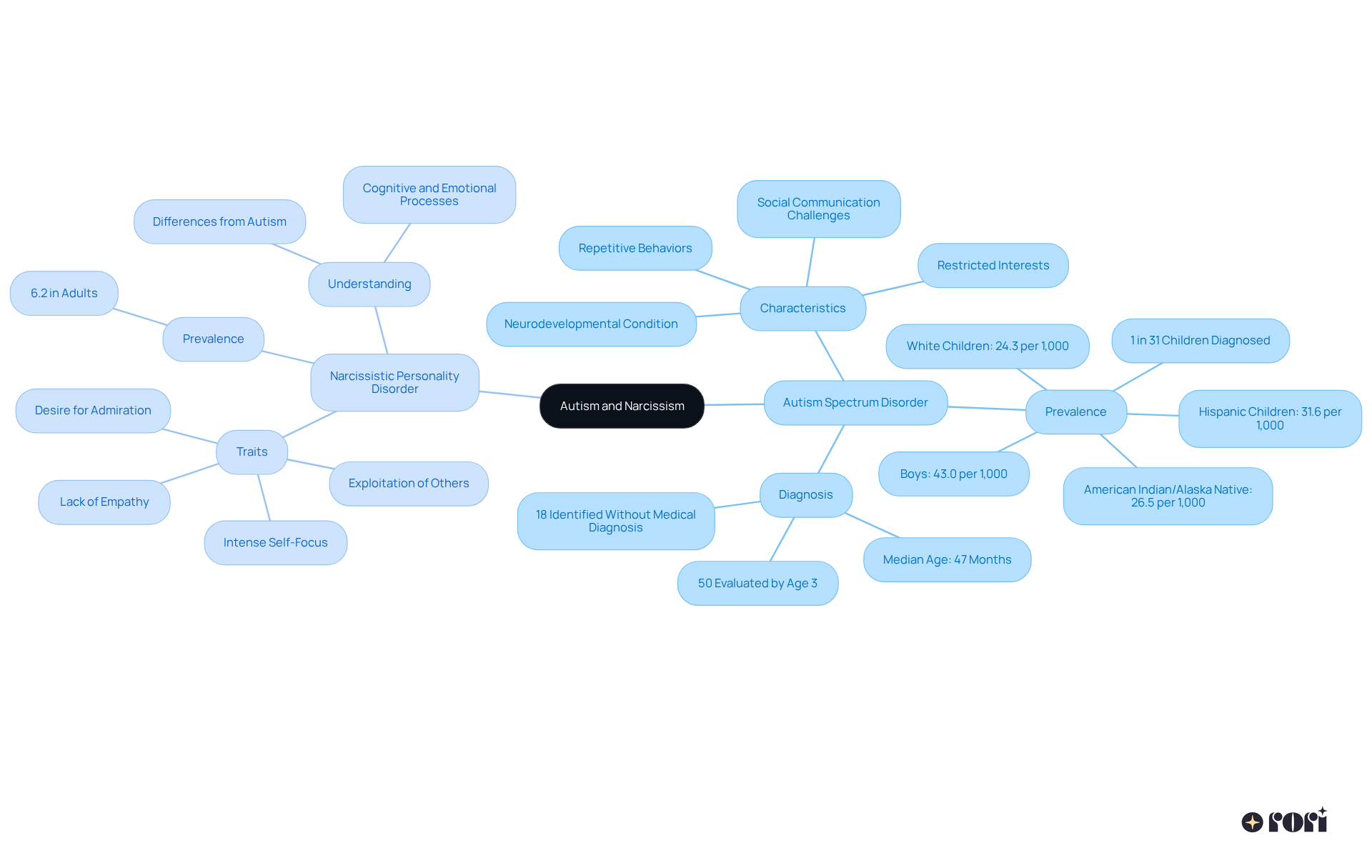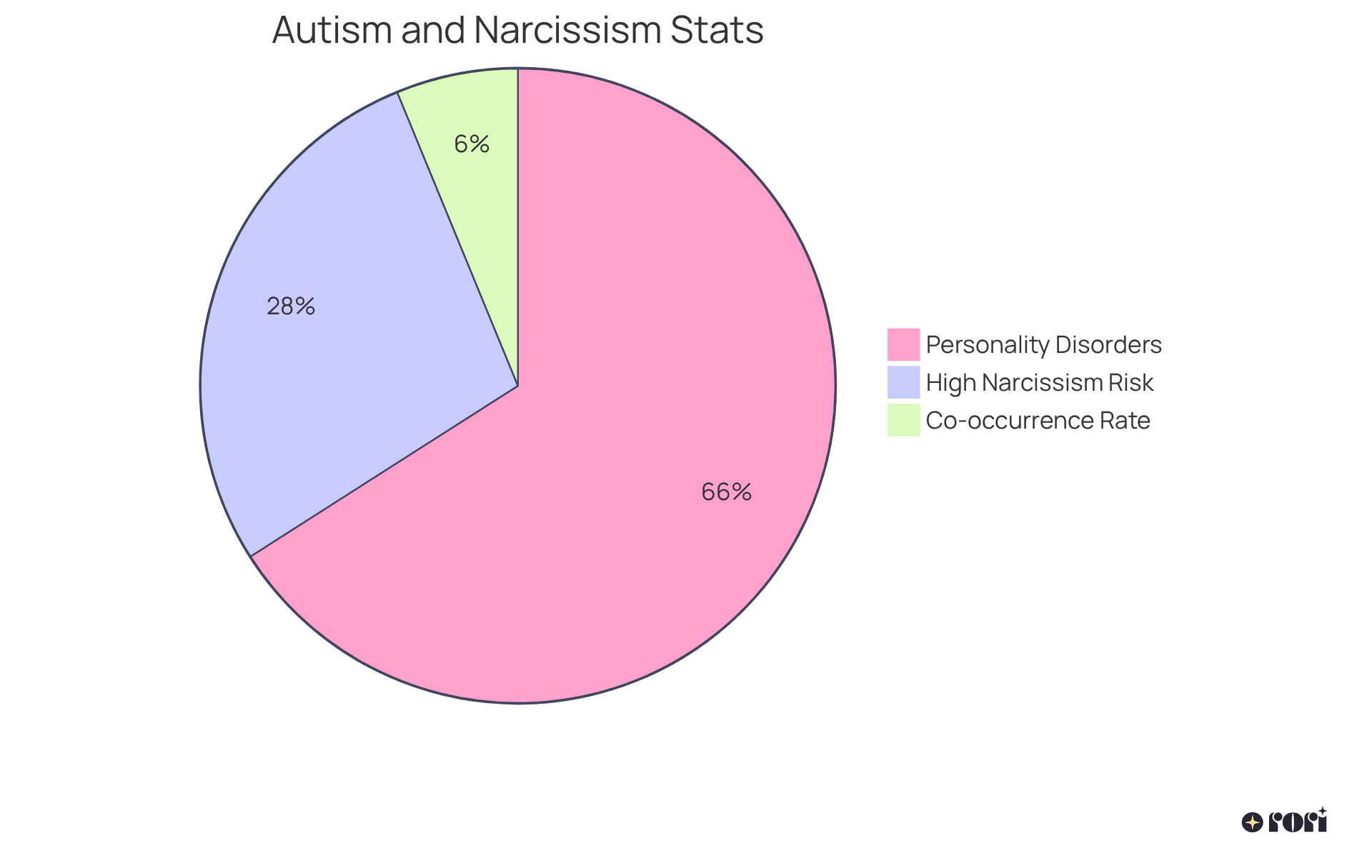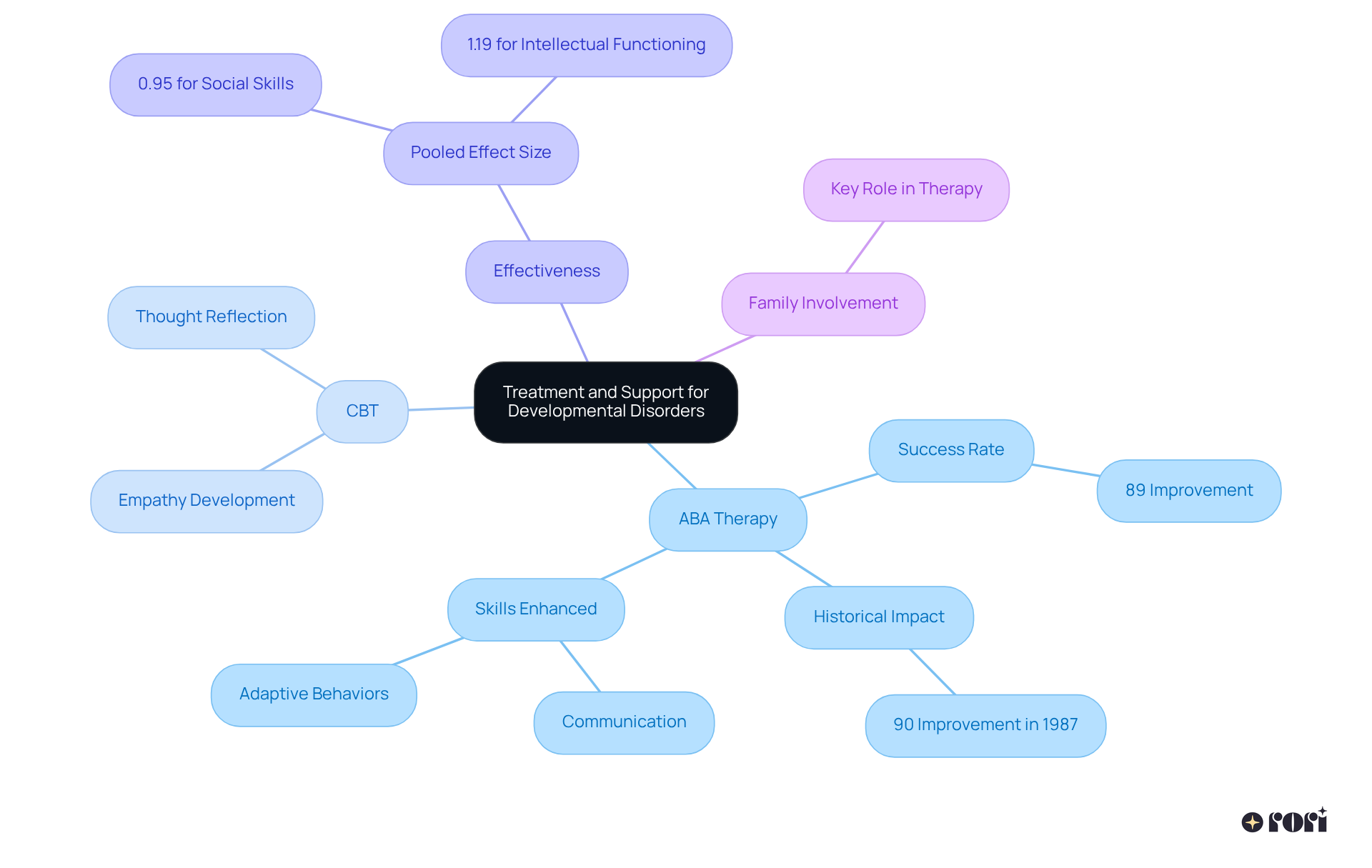This article takes a closer look at the intriguing question of whether individuals can have both Autism Spectrum Disorder (ASD) and Narcissistic Personality Disorder (NPD). While these two conditions are distinct, there can be some overlapping behaviors that might lead to a bit of confusion.
It’s important to note that co-occurrence is relatively rare, with only about 0% to 6.4% of individuals experiencing both. This highlights the need for accurate diagnosis and tailored treatment approaches to effectively tackle the unique challenges that each condition presents.
Let’s explore this together and understand how we can better support those affected!
Exploring the intricate relationship between Autism Spectrum Disorder (ASD) and Narcissistic Personality Disorder (NPD) reveals a fascinating landscape of overlapping traits and distinct challenges. Did you know that approximately 1 in 31 children are diagnosed with autism? Understanding whether one can possess both autism and narcissism is becoming increasingly relevant.
Research shows that many individuals on the spectrum may exhibit signs of narcissistic traits. But here’s the big question: can the self-centered behaviors sometimes observed in autistic individuals be misinterpreted as narcissism? Or is there a genuine coexistence of these two complex conditions?
Delving into this topic not only sheds light on the nuances of each disorder, but also emphasizes the importance of tailored treatment approaches to support those affected. Let’s explore this together!
Autism Spectrum Disorder (ASD) is a neurodevelopmental condition that can make interpersonal communication a bit tricky. It often comes with restricted interests and repetitive behaviors, and symptoms usually show up in early childhood. The severity of these symptoms can vary quite a bit from one individual to another. Many individuals on the spectrum face challenges in picking up social cues, which can make forming and maintaining relationships more difficult. Did you know that about 1 in 31 children in the U.S. is diagnosed with ASD? Prevalence rates can differ among demographics; for example, boys are diagnosed at a rate of 43.0 per 1,000, while for White children, it’s 24.3 per 1,000. This highlights the importance of early detection and intervention, especially since the median age for diagnosis is 47 months, with around half of children being assessed by age 3. Interestingly, nearly 18% of children were identified without a documented medical diagnosis, pointing to potential gaps in the evaluation process.
On the other hand, narcissism revolves around an intense focus on oneself, a strong desire for admiration, and often a lack of empathy. Narcissistic Personality Disorder (NPD) is a more extreme form of these traits, where individuals may display a grandiose sense of self-importance and might exploit others for personal gain. As of 2025, the prevalence of narcissism in adults is estimated to be about 6.2%, according to the latest data. This underscores the importance of understanding these personality traits in the mental health landscape.
Recognizing the unique traits of ASD and NPD is crucial, especially when considering if can you have autism and narcissism. While individuals with autism may struggle with social interactions, it raises the question of can you have autism and narcissism, as their challenges stem from different cognitive and emotional processes compared to those with narcissistic traits. Understanding these differences can lead to more effective diagnosis and treatment methods, ensuring that everyone receives the tailored support they need. Let’s explore this together!

While autism and narcissism are distinct disorders, one may wonder, can you have autism and narcissism, as they can sometimes overlap in ways that might be confusing. For example, many individuals on the spectrum often struggle to interpret social signals and emotions, which can occasionally be mistaken for self-centeredness. This behavior usually arises from neurodevelopmental challenges, not from a true lack of empathy, which is a key trait of narcissism.
Research shows that about 68% of autistic individuals meet the criteria for at least one personality disorder, which raises the question: can you have autism and narcissism, as a notable number exhibit signs of vulnerable narcissism, particularly when they feel left out. Furthermore, 28.7% of the ASD sample scored above the 90th percentile for the risk of pathological narcissism. Even with these overlaps, the inquiry of can you have autism and narcissism is underscored by the fact that the co-occurrence of Autism Spectrum Disorder (ASD) and Narcissistic Personality Disorder (NPD) is relatively rare, ranging from 0% to 6.4%. This highlights how important it is to accurately distinguish between these two conditions to avoid misdiagnosis.
The CDC recommends that all children be screened for developmental disorders at nine, 18, and 24 or 30 months, stressing the importance of early diagnosis and intervention. Understanding these nuances is vital for effective treatment and support. By recognizing that motivations behind social interactions can differ—where individuals with ASD may genuinely find it hard to read social cues, while those with NPD may manipulate social situations for their own gain—parents can better advocate for their children and navigate the complexities of their behaviors.
Let’s explore this together! Understanding these differences can empower you as a parent to seek the right resources and support. We’re here to help you every step of the way!

Caring for individuals with developmental disorders raises the important question of can you have autism and narcissism, which calls for a thoughtful and personalized approach. One effective method widely recognized is Applied Behavior Analysis (ABA) therapy. This evidence-based therapy focuses on reinforcing positive behaviors and teaching essential social skills, which can be a game-changer for those who struggle with interactions. Did you know that ABA therapy boasts an impressive success rate of over 89% in enhancing various skills like communication and adaptive behaviors? Back in 1987, 90% of individuals with autism saw improvements in their behavior after ABA treatments, showcasing the lasting impact of this approach.
For those exhibiting narcissistic traits, blending in therapeutic techniques like Cognitive Behavioral Therapy (CBT) can work wonders. CBT encourages individuals to reflect on their thoughts and actions, fostering greater empathy and understanding of others. Research backs this up, showing that targeted interventions can lead to significant gains in social skills, with a pooled effect size of 0.95 for social skills enhancement through ABA and a pooled effect size of 1.19 for improvements in intellectual functioning due to ABA interventions.
It’s important for clinicians to recognize the unique challenges faced by individuals, particularly regarding the question of can you have autism and narcissism. Treatment plans should be tailored and comprehensive, taking into account the severity of autism, specific therapy goals, and the support systems available to families. Family involvement is key! Parents and caregivers are vital players in the therapeutic journey. By providing resources that empower families to navigate these complexities, we can enhance treatment effectiveness and ultimately improve outcomes for individuals on the spectrum.
Let’s explore this together! Your role is invaluable, and we’re here to help you every step of the way!

Understanding the connection between Autism Spectrum Disorder (ASD) and Narcissistic Personality Disorder (NPD) reveals the complexity of these two distinct conditions. While individuals with autism may face challenges in social interactions due to neurodevelopmental factors, those with narcissism typically exhibit self-centered behaviors stemming from a lack of empathy. Recognizing these differences is crucial for accurate diagnosis and effective treatment.
The article highlights significant insights, including:
Research indicates that a notable percentage of autistic individuals may also display signs of narcissism, making it essential to distinguish between the two to avoid misdiagnosis and ensure appropriate support. Effective treatments such as Applied Behavior Analysis (ABA) and Cognitive Behavioral Therapy (CBT) can significantly enhance social skills and empathy, underscoring the need for personalized strategies.
Ultimately, fostering a deeper understanding of autism and narcissism can empower families and caregivers to advocate for the right resources and support. As we journey toward effective treatment and support, embracing the unique challenges faced by individuals with these conditions is vital. By promoting awareness and encouraging tailored interventions, we can better support those navigating the complexities of autism and narcissism, leading to improved outcomes and enhanced quality of life. Let’s explore this together!
What is Autism Spectrum Disorder (ASD)?
Autism Spectrum Disorder (ASD) is a neurodevelopmental condition that affects interpersonal communication, often accompanied by restricted interests and repetitive behaviors. Symptoms usually appear in early childhood and can vary significantly in severity among individuals.
How common is autism in children?
Approximately 1 in 31 children in the U.S. is diagnosed with ASD. Prevalence rates can vary by demographics, with boys diagnosed at a rate of 43.0 per 1,000 and White children at 24.3 per 1,000.
At what age are most children diagnosed with autism?
The median age for diagnosis of autism is 47 months, with around half of children being assessed by age 3.
What percentage of children are identified with autism without a documented medical diagnosis?
Nearly 18% of children identified with autism do not have a documented medical diagnosis, indicating potential gaps in the evaluation process.
What is narcissism, and how does it differ from autism?
Narcissism involves an intense focus on oneself, a strong desire for admiration, and often a lack of empathy. Narcissistic Personality Disorder (NPD) is a more severe form, characterized by a grandiose sense of self-importance and exploitation of others. Unlike autism, which primarily affects social interactions due to different cognitive processes, narcissism is rooted in self-centeredness and emotional deficits.
What is the estimated prevalence of narcissism in adults?
As of 2025, the estimated prevalence of narcissism in adults is about 6.2%.
Can a person have both autism and narcissism?
Yes, it is possible for an individual to have both autism and narcissism. However, the challenges faced by individuals with autism stem from different cognitive and emotional processes compared to those with narcissistic traits. Understanding these differences is essential for effective diagnosis and treatment.